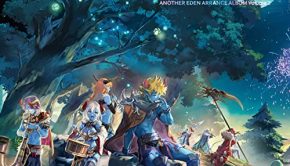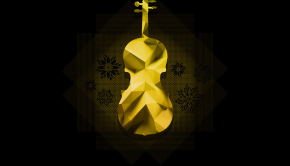Yasunori Mitsuda Interview: His Life and Works
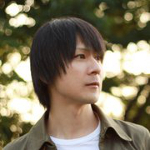 In October 2005, we conducted our first ever interview, this time with Yasunori Mitsuda. This interview provides an indepth analysis into his life and works, both as a Square employee and a freelancer, and provides considerable insight into his future projects and plans, including the Chrono Cross arranged album.
In October 2005, we conducted our first ever interview, this time with Yasunori Mitsuda. This interview provides an indepth analysis into his life and works, both as a Square employee and a freelancer, and provides considerable insight into his future projects and plans, including the Chrono Cross arranged album.
Interview Credits
Interview Subject: Yasunori Mitsuda
Interviewer: Chris Greening, Harry Simons, David Greening
Editor: Chris Greening
Translation & Localisation: Procyon Studio
Coordination: Harry Simons, Procyon Studio
Interview Content
Chris: You’re most well-known internationally for your Square works, though your many freelance works are often praised as well. Has there been a comparable level of interest towards your recent albums from fans of your Square works?
Yasunori Mitsuda: I think a good number of my fans today are fans of my work from back when I was with Square. As for their level of interests in my recent works, well… I’m not too sure myself, but I hope they’re good (laughs). But to tell you the truth, I’m not really the type of person who gets swayed by what other people think of me.
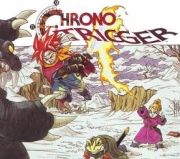
Chris: During your famous recruitment interview with Square, you reportedly stated that you told the company that you only wanted the job as a stepping stone for bigger roles. Did these feelings remain after composing hits such as Chrono Trigger and was this the primary reason you left the company in 1998?
Yasunori Mitsuda: My feelings never changed. I’m really hard-headed in that sense. Whenever I make up my mind on something, I really stick with it to the end. Also, regarding the question of why I left the company, the main reason was like I said, I wanted to move on to bigger and better things.
Chris: You stated in the liner notes to the Chrono Trigger Original Soundtrack that you found aspects of your music in the Chrono Trigger Original Sound Version to be immature. Do you find it ironic that this remains your most widely known work?
Yasunori Mitsuda: In my opinion, my compositions in Chrono Trigger are in fact very immature. But taking other aspects of the game such as graphics, scenario, sound, and music, the game was very well-balanced, which is the primary reason why the music has probably remained in the hearts of players.
Ask a person who has never played Chrono Trigger, for their opinions on the soundtrack, and they probably wouldn’t give you a very high rating. In that sense I think you can say that game music has to be in balance with other parts of the game, and having the music just stand out on its own is not beneficial for the game.
Also, a lot of people say that Chrono Trigger is my representative album, but I take on every project with everything I have and push myself to the limit, so I think that they’re all representative works.
Chris: The first project you and Yoshitaka Hirota worked on together was Chrono Trigger. Did you ever correspond directly in this project or did you work separately all the time? Has working with him on the Shadow Hearts series been considerably different?
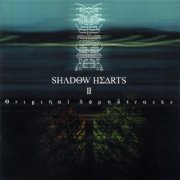 Yasunori Mitsuda: I think I should start off by explaining WHY Hirota began working at Square as a sound effects programmer. I’m sure most of you know this part of the story, but when I first entered the company, I was employed under the title of “composer” and although my title was still a “composer” I worked as a manipulator and sound effects programmer on games such as Romancing Saga 2, Hanjuku Hero, Final Fantasy V, andSeiken Densetsu.
Yasunori Mitsuda: I think I should start off by explaining WHY Hirota began working at Square as a sound effects programmer. I’m sure most of you know this part of the story, but when I first entered the company, I was employed under the title of “composer” and although my title was still a “composer” I worked as a manipulator and sound effects programmer on games such as Romancing Saga 2, Hanjuku Hero, Final Fantasy V, andSeiken Densetsu.
After a while, I got fed up with this and wrote a direct complaint to Sakaguchi-san who at the time was Vice President of the company. Turns out he gives me a chance at this new title, Chrono Trigger.
Now that I was going to be working as a composer, who was going to take my place and work on the sound effects? I told Sakaguchi-san about the importance of having a specialist in sound effects, and he came back asking me if I knew anyone who could fill in on my job. And so I ended up calling up some of my friends from back in school, and Yoshitaka Hirota was one of them.
Regarding the work process with Hirota, sure we talked a lot during the Chrono Trigger project (on and off work, of course). But when I worked with him on Shadow Hearts, I worked with him not from the standpoint of composer to manipulator, but from the point of composer to composer, so there were some definite changes in the way that we worked with each other.
Chris: Three very different official arranged albums have currently been produced dedicated to your works at Square, these being Chrono Trigger: The Brink of Time, Tobal No. 1 Remixes Electrical Indian, and Xenogears Creid. What are your general thoughts on such albums and which is your personal favourite, if any?
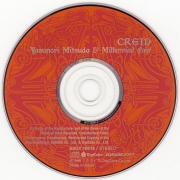 Yasunori Mitsuda: I enjoy making albums like these. I like each one of these arranges, and they’re all very much a part of me.
Yasunori Mitsuda: I enjoy making albums like these. I like each one of these arranges, and they’re all very much a part of me.
Chris: As a result of the huge popularity of your Square works, many fans arrange compositions from them as well, generally for fun, not profit. Are you interested in such arrangements, and, if so, how do you feel they compare to professional ones?
Yasunori Mitsuda: I’m very happy to see so many people excited about my work and making arrange albums (for fun). I’ve heard some really wonderful arrangements on some of these, and it’s really fun to listen to other people’s interpretations of my pieces.
Chris: Having last worked on behalf of Square in 1999, the music produced by the company has changed considerably, though Junya Nakano, Masashi Hamauzu, and Ryo Yamazaki, all of whom you once worked directly alongside, remain there. Have you followed the abovementioned composers’ careers closely and do you otherwise enjoy new music produced on behalf of the company?
Yasunori Mitsuda: Yes, indeed the company has changed a lot since the merger with Enix. I still keep in touch with some of the sound team members from Square, but I don’t really follow other composers’ works.
Chris: Your first major non-Square album was An Cinniùint. Some consider this to be your pinnacle of achievement in Celtic music, though some fans prefer the Celtic music featured in Xenogears. How do you feel your different approaches to such music compare yourself?
Yasunori Mitsuda: Regarding Xenogears, I took the stance of writing a easy-to-listen-to pop song and putting a Celtic essence into it. In An Cinniùint, I wanted to make a really dense album and fill the entire album with Celtic music. So the approach in these two albums is totally different.
Chris: It seems surprising that you were a sound producer for Hitoshi Sakimoto’s score for Breath of Fire V: Dragon Quarter after your understandable negativity regarding sound programming at Square. Was working with Sakimoto on Legaia Duel Saga the primary reason for accepting such a role or were there more intricate reasons?
Yasunori Mitsuda: Negative? Not at all. I think that the reason why all the sound in the Square games on the SNES platform sounded so good was due to efforts of sound programmer, Minoru Akao (presently working for Square Enix) and me. We used and created a variety of innovative techniques to better the sound effects in games. Not only was I the only composer that could work as a manipulator, I was known throughout the company as the most picky person when it came to sound quality. So I have never been negative about anything regarding sound programming or manipulating at Square. In fact, I’m very positive!
The reason why I took the role of sound producer in Breath of Fire V: Dragon Quest is that initially, I was supposed to work on the title as a composer but was unable to, due to my schedule. So I ended up asking Sakimoto-san if he would take up the offer. Also, we had some members of our company work as the manipulator for the Sakimoto-san’s pieces, along with other members who also worked on the sounds for the game, so I ended up taking the job of sound producer and supervised our side of the sound team.
Chris: The Shadow Hearts series is renowned for its diverse and unusual scores. What attracted you towards composing for the series’ first two scores and arranged album? How significant do you think the series’ albums will be as an influence for game music’s future development?
Yasunori Mitsuda: Well I’ve known Hirota longer than almost anyone I know, and I knew that he had the talent to write good pieces. It was just that at the start of the series, he didn’t have a solid career behind him yet, and his name wasn’t really known publicly. That’s probably the reason why I was called to join him the first time — because they wanted my name on the title. But after getting an explanation of the Shadow Hearts project, it sounded rather interesting, so I decided to take on a few tracks for the album. Also, part of the reason why I took up the offer was because I wanted to try working with Hirota.
Chris: Your approach to Hako no Niwa was an interesting change of style to most of your fans. How did the project’s production differ from most of your other works? Were you influenced at all by Zuntata’s compositions for the first game in the series, Rakugaki Kingdom?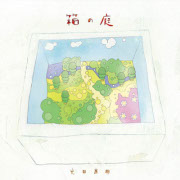
Yasunori Mitsuda: Hako no Niwa was definitely a bold new step for me. But I’m very proud of the work that I did in this album. I never listened to the soundtrack of the previous game, Rakugaki Kingdom, by the way. So the answer to your question would be that I was never influenced by Zuntata’s compositions.
Chris: Talking of experimentation, your full orchestral compositions inXenosaga Episode I and big band works in Moonlit Shadow are generally considered to be some of your most nourishing compositions to date. Composing for which ensemble was the most challenging? Would you consider composing for such ensembles again?
Yasunori Mitsuda: I think working with an orchestra was the most difficult but also the most fun. I’d like to try composing for an orchestra again if I have the chance. But that doesn’t mean I didn’t enjoy working with a big band. I love jazz too.
Chris: The Dark Chronicle Premium Arrange and Street Fighter Tribute Album both featured arrangements from you. What do you feel your contributions added to these albums? Why were you not involved in other similar projects, such as the Phantasy Star Online I & II Premium Arrange?
Yasunori Mitsuda: I’m not sure if I really made that big a contribution. I think that would be a question for the fans to answer. As for the arrange soundtrack for Phantasy Star Online, I was offered to take part in this, but I was too busy at the time and had no choice but to decline the offer.
Chris: KiRite is your most recent project and involved the composition of 14 pieces of music to accompany a book by Masato Kato. How did composing for KiRite compare to composing for standard game soundtracks? Was it more or less difficult to find inspiration?
Yasunori Mitsuda: From a composer’s point of view, I don’t think there was any difference. But I had to compose these tracks in between other titles, and it was really hard making the transition from one title to the other. I’ve realized now that this is NOT the way that I should take on my works.
Chris: Please can you share your personal thoughts and any other interesting details about your scores to Mario Party, Bomberman 64, and The Seventh Seal, which didn’t get the benefit of a full release. What proportion of the original compositions featured on The Seventh Seal were present in Sailing to the World?
Yasunori Mitsuda: Interesting stories… Well I don’t really have too much to talk about, but for Mario Party I ended up writing a total of 200 tracks. Only 60 were actually used in the game. It was number one in terms of the number of compositions rejected (laughs).
Sailing to the World has all the compositions that were originally used in the game, The Seventh Seal. The only track that’s not included is this one battle track, but I don’t think it was used in the game either so I decided to leave it out on the album.
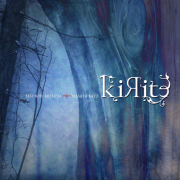 Chris: Finally, if possible, please give us some further details about your upcoming projects. How does it feel to be involved in a ten composer project such as Monster Kingdom: Jewel Summoner and how large is your role? Is the Chrono Cross arranged album still set to be released and can you give any further details about it?
Chris: Finally, if possible, please give us some further details about your upcoming projects. How does it feel to be involved in a ten composer project such as Monster Kingdom: Jewel Summoner and how large is your role? Is the Chrono Cross arranged album still set to be released and can you give any further details about it?
Yasunori Mitsuda: With regards to Monster Kingdom: Jewel Summoner, I can’t really comment on because I haven’t even heard the other composers works yet. I get nervous about projects like this where you have various composers come together, because it’s really hard to create a unified world theme. My job in this album was to create a piece that would add my own personal touch to it. In that sense, I think you can say that I did my part.
Regarding the Arranged Version of the Chrono Cross soundtrack, it’s still in progress right now. But as I learned through my work in KiRite, I know now that I shouldn’t try to compose or arrange songs while working on other projects. I’m not going to try to rush myself to get this album completed, so the release date isn’t set yet.
Chris: Many thanks for taking the time out of your busy schedule to participate in this interview. It is an honour to interview you and we would like to wish you the very best of luck for the future. Do you have any final thoughts or comments to say to your fans?
Yasunori Mitsuda: I’m very happy that I have all these great fans, patiently waiting for the release of my albums. Thank you very much for your support over the years. I will do my best to bring you even more good music in the future, so please stay tuned!
Posted on October 1, 2005 by Chris Greening. Last modified on February 28, 2014.


